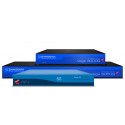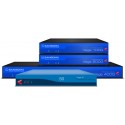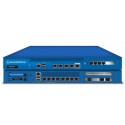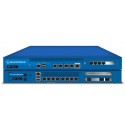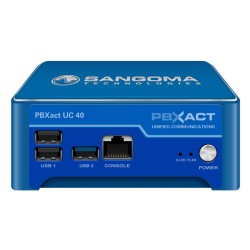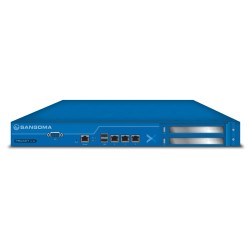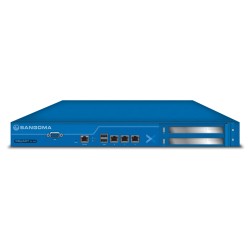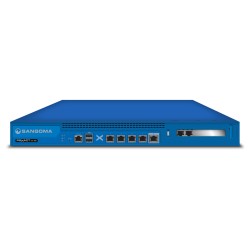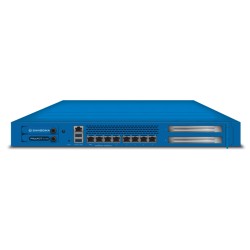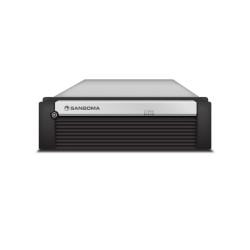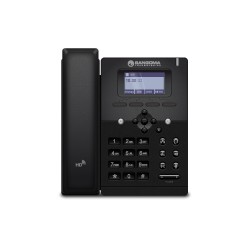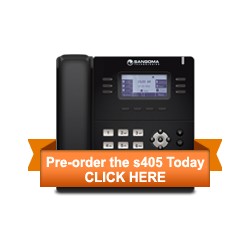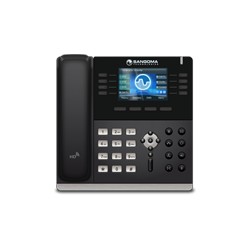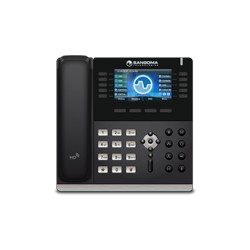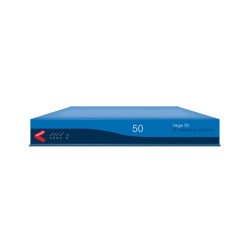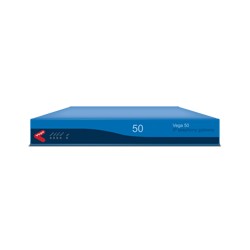Sangoma
Enhanced Cloud-based Unified Communications
PBXact UCC (Unified Cloud Communications) delivers cloud-based telephony services to small and medium sized businesses who are looking for a feature-rich, unified communications solution that can be tailored to meet their business demands.
For a monthly flat fee, PBXact UCC removes the burden of owning...
Enhanced Cloud-based Unified Communications
PBXact UCC (Unified Cloud Communications) delivers cloud-based telephony services to small and medium sized businesses who are looking for a feature-rich, unified communications solution that can be tailored to meet their business demands.
For a monthly flat fee, PBXact UCC removes the burden of owning and maintaining a costly on-premise PBX solution and takes ownership of infrastructure maintenance so you don’t have to, providing a full suite of services to your organization. Since PBXact UCC is a hosted service, no matter where you are your PBX is always available, from desk phone, softphone, mobile or laptop.
PBXact comes with an extensive set of Unified Communications features such as Phones Apps productivity features with Sangoma IP phones, UCP for web based communications and Zulu UC for desktop and CRM integration, all facilitating collaboration and productivity.
Benefits
Why PBXact UCC?
PBXact UCC offers not only the same benefits as our popular on-premise PBXact UC solution, but incorporates many powerful features that only the cloud can bring.
Voicemail
Each extension comes complete with voicemail. Users can call retrieve their voicemails from any device or through a web browser and their personal user control panel.
User Control
Each user gets access to their unique User Control Panel. This allows them to manage voicemails, set call forwards and configure other phone features like presence and do not disturb
Auto Attendant
Auto Attendants can be used to allow callers to directly dial an extension select or select a job function using their phone keypad.
Groups
Groups can be used to efficiently handle calls to a particular job function like sales or support. Team member’s phones can configured to ring either sequentially or simultaneously.
Conferences
With no limit on the number of conference rooms that can be created, it’s easy to empower your workforce to run conference calls with no extra expense
Open Standards
PBXact UCC works best with Sangoma phones, but it’s also possible to use any other type of standard SIP phone.
Why Cloud?
- No PBX Hardware
PBXact is a fully hosted system, we take care of all the hassle of the infrastructure maintenance so you don’t have to.
- Accessible
No matter where you are your PBX is always available. From deskphone, softphone, mobile or laptop.or through web browser with webrtc.
- Reliability
Using the latest data centre technology together with rigourous back-ups and resiliency means that moving to the cloud reduces risk.
- Future Proof
Using a managed service in the cloud means that you are buying a future proof solution. We’ll take care of all the upgrades so that you benefit from features as they become available.
- Multi-Site
For businesses with more than one site a single instance of PBXact UCC can give you telephony service across all your sites with all users experiencing the same features from the same PBX.
Installation Wizard
The quick-start Installation Wizard for PBXact UC & PBXact UCC makes it incredibly easy to get your PBX set up with basic configuration in just a few minutes!
Here are some of the items it configures:
- Extensions. Choose the number of extension and the range
- AutoAttendant / IVR. Select how inbound calls should be routed at different times of day and even record voice prompts directly from your computer via the web browser.
- Ring Groups. Decide how phones for each team should ring and what will happen to the call if no one picks up.
- Fax. PBXact UCC can deal with FAX calls as well and it’s easy to decide how to route them.
Bring us your phone number or choose your own
PBXact UCC allows you to select new numbers or bring your own numbers with you – a service called porting.
PBXact UCC gives you the freedom to select as few or as many numbers as you need. If you need one inbound number, also known as a DID, you can have all your customers call that number and then use an IVR (Interactive Voice Response) to allow callers to dial an extension or a business function like sales or support. If your business requires you to use a public number to advertise, no problem, it’s easy to associate an inbound number directly with an extension. The caller will be routed directly to the extension.
Of course, it’s no problem to mix the two and have some users with DIDs and others accessible through an IVR
Build your solution with Sangoma IP Phones
Designed specifically for PBXact UCC, Sangoma’s line of IP Phones autoprovision themselves out-of-box using our Redirection/Auto-configuration. This eliminates the requirement of involving IT resources to manually configure network and user details. Auto-deployment also works for remote users too!
Included with all Sangoma IP Phones are Phone apps which allow user to control complex features directly from the phone’s colour display. Features such as Call Parking, Follow me, Conference rooms, Hot desking, Presence and many more. No more feature codes to remember!
Best of all, you can order your phones at the same time you purchase & configure your PBXact UCC services. This way you can have your phones delivered to you already pre-provisioned to work with your new setup.
PBXact UCC Feature Support Included in All Systems
Business Features
- Flexible Time-Based Call Routing
- Built-In Conference Bridge
- Fax to E-mail
- Hunt/Ring Groups
- Music on Hold
- Voicemail Blasting
- Find Me / Follow Me Calling
- Personal IVRs
- Wake Up Calls
- Support for Video Calling
- Secure Communications (SRTP/TLS)
- Announcements
- Text to Speech
- Calling Queues (ACD)
- Interactive Voice Response (IVR)
Calling Features
- Three-Way Calling Support
- Voicemail
- Voicemail to E-mail
- Caller ID Support
- Call Transfer
- Call Recording
- Do Not Disturb
- Call Waiting
- Call History / Call Detail Records
- Call Event Logging
- Speed Dials
- Caller Blacklisting
- Call Screening
Telephony Support
- Open Standards Support for Multiple Protocols
- SIP, IAX2, PRI, T1, E1, J1, R2, POTS/Analog, ISDN, GSM
- WebRTC
- Softphone Support
- Specialty Device Support
- Door Phones
- Overhead Paging
- Strobe Alerts
- Paging Gateways
- Voice Gateways
- Failover Devices
- Desktop/Mobile Phone Support
Administration
- Upgrade System with Granular Control
- Bulk Import Utilities (Trunks, Extensions, Users, DIDs)
- Localization in both GUI and Sound Files for Multiple Languages
- Backup and Restore Utilities
- Custom Destination Administration
- Web-based Config File Management When Needed
- System Recording Management
- GUI Controls for DNS, Network Settings, and More!
User Control Panel
- Responsive GUI (Desktop, Tablet, and Mobile Device)
- WebRTC Softphone
- Call History (Details and Recording Playback / Download)
- Contact Management
- Presence Management
- Conference Room Management
- Settings Management
- Find Me / Follow Me
- Call Forwarding, Call Waiting, Do Not Disturb
- Call Confirmation
- Voicemail
- Visual Voicemail – Playback and Management
- Notification Options
- Greetings Management
Add-ons
The Base Platform includes a base of system enhanced features (see chart below)
Additional functionality can be added as needed:
- High Availability (License Required per PBX Node)
- Call/Contact Center Features (Enhanced Call Center Functionality)
- Operator Panel / Wall Boards
- Third Party Phone Support (for Non-Sangoma IP Phones)
Why Choose Sangoma?
Sangoma’s customer-centric approach, product innovations, and worldwide network of distribution partners deliver the industry’s best-engineered, highest quality, IP and Unified Communications solutions, supporting “any app, anywhere” for businesses and service providers of all sizes.
All Sangoma products are backed by more than 30 years of IP communications experience, expert engineering and technical resources, and a comprehensive 1-year warranty. Extended warranties are also available.
Sangoma There are 27 products.
Subcategories
-
Analog VoIP Gateways
The Most Resilient VoIP Analog Gateways in Their Class
Connecting your legacy telephony infrastructure to modern VoIP systems has been made easy with Sangoma’s line of Analog Vega VoIP Gateways. The Vega VoIP gateways seamlessly connect your analog phone system to IP networks. This is great for businesses with legacy phone equipment (such as an analog PBX) who want to connect to SIP trunking services without having to spend money altering their network infrastructure. They are also great for businesses that are already VoIP enabled at the core (with an IP- PBX) that need PSTN connectivity for emergency fallback. Simply place the Vega Gateway at the edge of your network, plug in your existing internet cable for VoIP connectivity and analog cables from your phone system and let the Vega automatically handle the SIP signaling and voice media conversion for seamless voice and T.38 Fax integration.
Advanced Web GUI
Features an intuitive Quick Wizard which does all the hard work for you for new deployments. Flexible dialplan to allow you to make your own routes, including automatic failure detection with failover routing.
Diagnostic Tools
Web GUI based PCAP tracing tool to capture full signaling and media, eliminating the need to connect equipment for line tracing, fully compatible with wireshark.
Low and High Density Models
Our low density analog models called Vega 50 are offered with 2-10 ports of FXS and FXO combinations. Our High Density Vega 3000G and Vega 3050G offer 24 and 50 FXS ports, respectively.
Long Line Length
Connect your analog lines up to 8 kms from the Vega Gateway. Great for applications where the IT closet is located far away from the analog devices
Built-in Local Survivability
In the event of a WAN failure, IP phones behind the Vega gateway can continue to call each other, be routed to a backup switch or connected directly to the PSTN.
Qualified for Microsoft
Qualified for Lync 2013 and Skype for Business 2015.
Which one do I Choose?
- If you want to connect to SIP trunking service and have an analog PBX, the Vega 50 FXS is right for you Simply connecting the FXO lines from your PBX to the Vega 50 FXS ports for seamless connectivity.
- If you want to provide emergency fallback to your VoIP network, the Vega 50 FXO model is right for you. Connect the PSTN telco lines to the FXO ports for automatic fallback routing when your VoIP network goes down.
- If you want to connect a large quantity of analog phones to your IP-PBX, the Vega 3000G and Vega 3050G are right for you. These models are typically used hotels, schools, apartment buildings and other multi-dwelling environments to eliminate the need of change all the analog phones and infrastructure to IP.
Vega Analog Gateway Models
Vega Gateway models are one of the most reliable fault tolerant SIP-to-TDM media Gateways on the market, sized for your business needs. All Sangoma hardware carries a one year warranty with options to extend.
Use Cases
Enterprise VoIP Networking
Use a Vega gateway to allow site to site networking for toll bypass between sites or to connect legacy and new infrastructure together.
PSTN Trunking
Use a Vega gateway to allow IP-PBX to route calls to traditional PSTN connections like PRI, BRI or analogue. Could be primary route or for resilience.
Low Density PSTN
Connect your offices fax machines, door entry and modems to your company’s IP-PBX.
Enterprise IP Telephony Gateway
Using Enhanced Network Proxy (ENP) feature allows for local survivability of IP telephones. In case of SIP failure those onsite phones can talk to each other, the PSTN (if connected) and place emergency calls.
SIP Trunking
Vega Gateways allow traditional, legacy TDM based PBXs to replace expensive connections like PRI (E1T1) BRI or analogue with SIP trunking to allow reduced call costs, reduced line rental, and bring extra flexibility and disaster recovery.
Multi-Dwelling
For schools, hotels, apartment buildings, and military having large infrastructure of analog phones needing to connect to IP-PBX eliminating the need to replace any hardware or cabling.
Analog Gateway Features
Telephony Features
Call Waiting
Call Forward – Unconditional, Busy, No-Answer
Call Transfer – Blind, Consultative
3-Way Conference
Do Not Disturb
Message Waiting Indicator – Audible, Visual
Music on Hold
Executive Barge
Caller ID presentation – UK, DTMF, Bellcore GR30, ETSI
Caller ID screening
SIP registration & digest authenticationCall Quality
Adaptive jitter removal
Comfort noise generation
Silence suppression
802.1p/Q VLAN tagging
Differentiated Services (DiffServ)
Type of Service (ToS)
QoS statistics reporting
Echo cancellation (G.168 up to 128ms)Operations, Maintenance & Billing
HTTP(S) Web Server
RADIUS Accounting & Login
Remote firmware upgrade:
Auto code upgrade
Auto configuration upgrade
SNMP V1, V2 & V3
Syslog
TFTP/FTP support
VT100 – RS232/Telnet/SSH
Voice readback of IP parametersSecurity & Encryption
Media – SRTP (Optional)
SIP – TLS (Optional)
Management – HTTPS, SSH, Telnet
Configurable user login passwords
Enhanced Network Proxy (ENP)Routing & Numbering
Dial Planner – sophisticated call routing capabilities, standalone or gatekeeper/proxy integration
Direct Dialing In (DDI)
SIP registration to multiple proxiesSurvivability
Automatic re-routing of call traffic to backup PSTN connection
Local Survivability – Business Continuity during WAN/SIP outageAnalog Gateway Specifications
Interfaces
VoIP Interface
SIP
Fax support – up to G3 FAX, using T.38
Modem support – up to V.90, using G.711
H.323 version 4 (vega50 only)
H.323 version 4 (vega50 only)
VoIP channel support:
Vega 50:16
Vega 3000G:24
Vega 3050G:50
Vega 4×4:16
Audio Codecs:
G.711 (a-law/µ-law) (64 kbps)
G.729a (8kbps)
G.723.1 (5.3/6.4 kbps)
G.726
ClearmodeTelephony Interface
Vega 50
4 or 8 FXS ports with 2 FXO ports presented on RJ11
4 or 8 FXO ports presented on RJ11
600R, 900R or CTR-21 line impedance
Vega 3000G
24 FXS ports presented on 1 Amphenol connector
600R, 900R or CTR-21 line impedance
Vega 3050G
50 FXS ports presented on 2 Amphenol connector
2 FXO ports presented on optional expansion board
600R, 900R or CTR-21 line impedance
Vega 4×4
FXS: Up to 16 ports presented on RJ45 600R, 900R or CTR-21 line impedance
FXO: Up to 16 ports presented on RJ45 600R, 900R or CTR-21 line impedance
GENGEN: Up to 16 ports presented on RJ45 75V RMS ringing
AUDIO: Up to 16 ports presented on RJ45 Unbalanced audio input, receive (mic) and transmit (speaker)LAN Interface
Vega 50
2 RJ-45s, 10 BaseT / 100 BaseTX, full / half duplex
Vega 3000G
1 RJ-45, 1000BaseT/100 BaseTx/10 BaseT, full/half duplex
Vega 3050G
1 RJ-45, 1000BaseT/100 BaseTx/10 BaseT, full/half duplex
Vega 4×4
2 RJ-45s, 1000BaseT / 100 BaseTX / 10 BaseT, full / half duplexHardware
Certification- EMC (CLASS B)
- EN55022
- EN55024
- FCC Part 15
- AS/NZS3548
- TELECOMS (ISDN)
- E1: TBR4
- T1: FCC Part 68
- T1: CS-03
- VCCI
- Safety
- EN60950
- IEC60950
- UL60950
- AS/NZS60950
Dimensions- Vega 50
- 300mm (w) x 237mm (d) x 45mm (h)
- weight 1kgs (2.2lbs)
- Rackmount ears supplied
- Vega 3000G
- 1U: 270mm (W) x 155mm (D) x 43mm (H)
- Weight: 1.5kgs (3.31lbs)
- Rackmount ears supplied: 107mm (2 pieces)
- Vega 3050G
- 1U: 437mm (W) x 275mm (D) x 43mm (H)
- Weight: 6.5kgs
- Rackmount: brackets supplied 483mm (19″)
- Vega 4×4
- 1U: 437mm (W) x 275mm (D) x 43mm (H)
- Weight: 6.5kgs
- Rackmount: brackets supplied 483mm (19″)
Power Supply- Vega 50
- External AC adapter
- 100–240 VAC (50/60 Hz)
- DC output 12V/5A (60W)
- Vega 3000G
- External AC adapter
- 100–240 VAC (50/60 Hz)
- DC output 12V/5A (60W)
- Vega 3050G
- Internal PSU
- 24 ports: 100..240 VAC, 47..63 Hz, 1..0.5 A
- 48 ports: 1100..240 VAC, 47..63 Hz, 2..1 A
- -48V DC, 1.2A (Max) available subject to MOQ (Optional)
- Vega 4×4
- Internal PSU
- 24 ports: 100..240 VAC, 47..63 Hz, 1..0.5 A
- 48 ports: 1100..240 VAC, 47..63 Hz, 2..1 A
- -48V DC, 1.2A (Max) available subject to MOQ (Optional)
LED Indicators
- System: Power/System Ready/Activity
- LAN: Speed/activity
Environmental- 0° .. 40°C
- 0% .. 90% humidity (non-condensing)
FXS Line Length- Up to 8km at 1 REN
-
VoIP Digital Gateways
The Most Resilient VoIP Digital Gateways in Their Class
Connecting your legacy telephony infrastructure to modern VoIP systems has been made easy with Sangoma’s line of SIP-to-TDM Vega VoIP Gateways. The Vega VoIP gateways seamlessly connect your PRI (T1/E1) or BRI phone system to IP networks. This is great for businesses with legacy phone equipment (such as a TDM PBX) who want to connect to SIP trunking services without having to spend money altering their network infrastructure. They are also great for businesses that are already VoIP enabled at the core (with an IP- PBX) that need PSTN connectivity. Simply place the Vega Gateway at the edge of your network, plug in your existing internet cable for VoIP connectivity and E1/T1 or BRI cables from your phone system and let the Vega automatically handle the SIP signaling and voice media conversion for seamless voice and T.38 Fax integration.
Advanced Web GUI
Features an intuitive Quick Wizard which does all the hard work for you for new deployments. Flexible dialplan to allow you to make your own routes, including automatic failure detection with failover routing.Diagnostic Tools
Web GUI based PCAP tracing tool to capture full signaling and media, eliminating the need to connect equipment for line tracing, fully compatible with wireshark.Low and High Density Models
The Vega 100G and Vega 200G are our low density models with a maximum capacity for 30 and 60 SIP-TDM simultaneous calls. The Vega 400G is our high density model and the most flexible field upgradable unit for a maximum capacity of 120 simultaneous SIP-TDM calls.E1/T1 & BRI Interface
Each E1/T1 interface (for Vega 100G, 200G, 400G) and BRI interface (Vega 50 BRI) can be independently configured as network side or terminal side. The Vega gateway can therefore be connected to a PBX or the PSTN.Built-in Local Survivability
In the event of a WAN failure, IP phones behind the Vega gateway can continue to call each other, be routed to a backup switch or connected directly to the PSTN.Qualified for Microsoft
Qualified for Lync 2013 and Skype for Business 2015.Vega Digital Gateway Models
Vega Gateway models are one of the most reliable fault tolerant SIP-to-TDM media Gateways on the market, sized for your business needs. All Sangoma hardware carries a one year warranty with options to extend.
Use Cases
Enterprise VoIP Networking
Use a Vega gateway to allow site to site networking for toll bypass between sites or to connect legacy and new infrastructure together.PSTN Trunking
Use a Vega gateway to allow IP-PBX to route calls to traditional PSTN connections like PRI, BRI or analogue. Could be primary route or for resilience.Low Density PSTN
Connect your offices fax machines, door entry and modems to your company’s IP-PBX.
Local Survivability
Using Enhanced Network Proxy (ENP) feature allows for local survivability of IP telephones. In case of SIP failure those onsite phones can talk to each other, the PSTN (if connected) and place emergency calls. Discover MoreSIP Trunking
Vega Gateways allow traditional, legacy TDM based PBXs to replace expensive connections like PRI (E1T1) BRI or analogue with SIP trunking to allow reduced call costs, reduced line rental, and bring extra flexibility and disaster recovery.PSTN connectivity for MS Lync / SFB Infrastructure
Vega Media Gateways qualified and tested for use with Microsoft Lync allow Lync to reliably and securely connect to PSTN trunks and legacy PBXs.Digital Gateway Features
Telephony Features
Caller ID presentation
Caller ID screening allows connections to be accepted only from selected call sources
SIP Registration & Digest AuthenticationCall Quality
Adaptive jitter removal
Comfort noise generation
Silence suppression
802.1p/Q VLAN tagging
Differentiated Services (DiffServ)
Type of Service (ToS)
QoS statistics reporting
Echo cancellation (G.168 up to 128ms)Operations, Maintenance & Billing
HTTP(S) Web Server
RADIUS Accounting & Login
Remote firmware upgrade:
Auto code upgrade
Auto configuration upgrade
SNMP V1, V2 & V3
TFTP/FTP support
VT100 – RS232Security & Encryption
Management – HTTPS, SSH, Telnet
Configurable user login passwords
SIP/TLS and SRTPRouting & Numbering
Dial Planner – sophisticated call routing capabilities, standalone or gatekeeper/proxy integration
Direct Dialing In (DDI)
SIP registration to multiple proxies
NAT traversalRedundancy/Survivability:
Hardware failover using port bypass (Vega 400G only)
Local Survivability – Business Continuity during WAN/SIP outageDigital Gateway Specifications
Interfaces
VoIP Interface
SIP
Fax support – up to G3 FAX, using T.38
Modem support – up to V.90, using G.711
VoIP channel capacity:
Vega 100G:30
Vega 200G:60
Vega 400G up to 120
Vega 50 BRI
2 BRI interfaces (4 channels)
4 BRI interfaces (8 channels)
8 BRI interfaces (16 Channels)
Audio Codecs:
(a-law/µ-law) (64 kbps)
G.723.1 (5.3/6.4 kbps)
G.729a (8kbps)
G.726
T.38Telephony Interface
Primary Rate ISDN (User configurable NT/TE):
T1
NI1/NI2
AT&T 5ESS
CAS (RBS)
DMS100
ISO QSIG
CAS Private Wire (*400G)
E1
Euro-ISDN
ISO QSIG
VN4
CAS R2MFC
CAS Private Wire (*400G)
BRI
2, 4 or 8 S/T interfaces presented on RJ45
Point-to-point or point-to-multipoint
Each interface can be configured NT or TEOpen-Non Proprietary
ETSI, VN4, ISDN
NI1, NI2, AT&T 5ESS, DMS100
ISO QSIG Basic Call and QSIG Feature Transparency
Channel Associated Signalling (CAS)
R2 MFCLAN Interface
2x RJ-45, 1000BaseT / 100BaseTx / 10BaseT, full / half duplex
Hardware
Certification
EMC (CLASS B)
EN55022
EN55024
FCC Part 15
AS/NZS3548
TELECOMS (ISDN)
E1: TBR4
BRI: TBR3
T1: FCC Part 68
T1: CS-03
VCCI
Safety
EN60950
IEC60950
UL60950
AS/NZS60950Dimensions
Vega 100G/ 200G
70mm (W) x 155mm (D) x 43mm (H)
Weight: 1.20kgs (2.64lbs)
Rackmount ears supplied: 107mm (2-pieces)
Vega 400G
437mm (W) x 153mm (D) x 43.5mm (H)
Weight: 1.97kgs (4.35lbs)
Rackmount ears supplied
Vega 50 BRI
299.73mm (W) x 237.06mm (D) x 44.45mm (H)
Weight: 1.02kg (unit only)
Rackmount ears suppliedPower Supply
Vega 100G/ 200G
External AC-to-DC power brick 100..240 VAC, 47..63 Hz, 1..0.5 A
Vega 400G
Internal PSU 100..240 VAC, 47..63 Hz, 1..0.5 A
Vega 50 BRI
External AC-to-DC power brick 100..240 VAC, 47..63 Hz, 1..0.5 ALED Indicators
Power
ISDN: NT/TE & link up
LAN: Speed/activityEnvironmental
0° .. 40°C
0% .. 90% humidity (non-condensing) -
NetBorder VoIP Gateways
The Most Flexible Carrier-Grade High Density VoIP Gateway
Although the telecommunications industry is rapidly adopting the Internet Protocol to provide Voice-over-IP (VoIP) services, the legacy PSTN network (using T1/E1 telco lines) is still prevalent for world-wide communication. As such there is a growing need for equipment that can seamlessly bridge legacy PSTN and VoIP services, whilst offering a variety of protocol support.
The Sangoma VoIP Media Gateway is the answer to this challenge offering seamless interconnection of next generation VoIP and the legacy PSTN networks, scalable up to 32 T1/E1 lines (or 960 simultaneous calls) in a 1 U form factor. Supporting concurrent use of ISDN, CAS (R2), SIP, T.38 fax Sangoma’s on-premise VoIP Gateway appliances are perfect for service providers migrating from legacy services to IP-centric architectures and large enterprises & call centers to deliver high-volume SIP trunking. Integrated transcoding capabilities also guarantees NVG to interop with any open source or propriety PBX solution and increase ROI by compression VoIP traffic.
Advanced Web GUI
Browser-based GUI use for configuration, control and monitoring of PRI links and network connections and load. Easy to use dialplan routing for basic and advanced call routing configurations. System logs and reports are also available directly from the GUI.
Diagnostic ToolsBrowser based dashboard featuring time based graphing, system and session error reporting and email notifications upon faults. Onboard PCAP training tool capturing signaling and media, eliminating the need for extra port mirrors or hubs. The Hardware Crash protection feature reboots the system on lockup or hardware fault.
Scalable and Flexible
NVG is future proof with field upgradable licensing for up to 32 T1/E1s or 960 simultaneous calls in a 1 U platform and flexible with routing between any PRI, CAS (R2) and SIP interconnection using its advanced XML routing engine.
Simplified LicensingAll NSG appliances are field upgradable and licensing is per channel, which means all the features are always included – No sticker shock. Predictable NSG capacity and cost in every use case.
Proven Interoperability with Global installationsNVG has been deployed globally, which can attest to its highly successful interoperability and integration with PRI and VoIP carriers. On-board transcoding capabilities ensure interoperability with any open-source or proprietary PBX. So you never have to worry about new deployments wherever they may be.
Enhanced Media CapabilityNVG has extensive support for various wireline, mobile and audio codecs which guarantees interoperability with service providers, enriched audio quality and improved ROI. NVG comes with support for AMR, AMR-WB (G.722), GSM, G729AB, G.723, G.726 and iLBC, all configurable on a per channel basis. Extensive support for T.38 protocol which is used for Fax-Over-IP comes standard.
Use Cases
SIP Network to ORI InterconnectProvide High value VoIP services to your customers.
High-Density Call Completion Platform
Provide competitive long distance and large scale call completion applications using cost-effective.
Migrate Legacy Infrastructure to VoIP Services
For large Enterprises, Carriers and Call Centers using legacy PRI/MFCR2 equipment, reduce telephony costs by seamlessly connecting an NVG appliance to access VoIP based services.
PSTN Trunking for Large Call Center
Connect your Large IP-PBX Based call centers to your trusted PRI/MFCR2 TDM trunks.
NetBorder Gateway Features
Echo Cancellation
DTMF detection and generation:
RFC2833 tone relay
In-band
SIP info
G.168-2002 with 128ms tailVoIP Protocols
SIP V2 / RFC3261
SCTP RFC 2960PSTN Protocols
Primary Rate ISDN (PRI)
E1: Euro-ISDN, CAS MFCF2
T1: Q.931, NI2, 4ESS, 5ESS, DSM-100Call Routing
Configurable and extendable XML-based dial plan and routing rules
Capacities
Flexible 8 port appliance
8 E1/T1 ports, or 240 channels
16 port appliance
16 E1/T1 ports, or 480 channels
32 port appliance
32 E1/T1 ports, or 960 channelsDebugging
Dedicated Browser interface for capturing full RTP media and signaling information
Onboard browser-based PCAP tracing, signalling and media – wireshark compatible
Large onboard storage capacity for long term tracingAudio Codecs
G.711
G.723.1
G.726
iLBC
G.729AB
GSM
G.722
AMR
G.722.1
Fax Support; T.38 Fax RelayManagement & Configuration
Web GUI
Command line interface
Detailed logs with con gurable le size and autorotation
SNMP
Radius
Call detail records in XML format
Remote firmware upgradeNetBorder Gateway Specifications
Interfaces
PSTN Interfaces
8 port appliance
8 E1/T1; One 8-port telephony interface (RJ45 ports)
16 port appliance
16 E1/T1; Either two 8-port telephony interface (RJ45
ports) or one 16-port telephony interface (16-port interface requires 68-pin SCSI type interface)
32 port appliance
32 E1/T1: Two 16-port telephony interfaces (16-port interface requires 68-pin SCSI type interface)Network Interface
8 port appliance
5x LAN 10/100/1000 BaseT Ethernet ports
IPV4, IPV6
1x IPMI remote management Interface
2x USB ports
1x console port
16/32 port appliance
7x LAN 10/100/1000 BaseT Ethernet ports
IPV4, IPV6
1x IPMI remote management Interface
2x USB ports
1x console portHardware
8 Port Appliance
1U: 430mm (W) x 305mm (D) x 45mm (H)
7.2kgs (16lbs)
60W universal AC power16 Port Appliance
1U: 430mm (W) x 470mm (D) x 45mm (H)
15kgs (33lbs)
250W universal AC power32 Port Appliance
1U: 430mm (W) x 470mm (D) x 45mm (H)
15kgs (33lbs)
250W universal AC power -
NetBorder SS7 VoIP...
The Most Flexible Carrier-Grade Solution for SS7 to VoIP interconnect
Although the telecommunications industry is rapidly adopting the Internet Protocol to provide Voice-over-IP (VoIP) services, the legacy PSTN SS7 network (using T1/E1 telco lines) is still prevalent for world-wide communication. As such there is a growing need for equipment that can seamlessly bridge legacy PSTN and VoIP services, whilst offering a variety of protocol support.
The Sangoma NetBorder SS7 VoIP Media Gateway is the solution to this challenge offering seamless interconnection of next generation VoIP and the legacy SS7 networks. Sangoma’s line of Carrier-Grade SS7 VoIP Gateways are scalable, cost-effective TDM and SIP-over-IP telephony solutions supporting up to 64 T1/E1 lines, or 1920 concurrent calls. Supporting concurrent use of ISDN, SS7 CAS (R2), SIP, and SIGTRAN signaling protocols, Sangoma’s on-premise SS7 VoIP Gateway appliances connect traditional SS7 edge, core and peer zones with new-generation, MEGACO and SIP networks with transcoding capabilities. Bundling together the signaling and media gateway controllers makes this an ideal solution to reduce footprint and need to source components from multiple vendors.
Advanced Web GUI
Browser-based GUI use for configuration, control and monitoring of SS7 links and network connections and load. Easy to use dialplan routing for basic and advanced call routing configurations. System logs and reports are also available directly from the GUI.
Software OptionsFor integration within existing data centre infrastructures, NSG is also offered in a software platform version which contains the same feature- rich capabilities as our scalable appliances and compatible in all commercially available servers and Linux distributions.
Scalable and FlexibleNSG is future proof with field upgradable licensing for up to 64 T1/E1s or 1920 simultaneous calls in a 1 U platform and flexible with routing between any PRI, SS7 and/or SIP interconnection using its advanced XML routing engine.
Simplified LicensingAll NSG appliances are field upgradable and licensing is per channel, which means all the features are always included – No sticker shock. Predictable NSG capacity and cost in every use case.
Proven Interoperability with Global installationsNSG has been deployed globally, which can attest to its highly successful interoperability and integration with SS7 and VoIP carriers. On-board transcoding capabilities ensure interoperability with any open-source or proprietary PBX. So you never have to worry about new deployments wherever they may be.
Diagnostic ToolsBrowser based dashboard featuring time based graphing, system and session error reporting and email notifications upon faults. Onboard PCAP training tool capturing signaling and media, eliminating the need for extra port mirrors or hubs. The Hardware Crash protection feature reboots the system on lockup or hardware fault.
NetBorder SS7 VoIP Gateway Models
Scalable and flexible, Sangoma’s NetBorder SS7 VoiP Gateways offer concurrent use of ISDN, SS7 CAS (R2), SIP, and SIGTRAN signaling protocols all in one package, eliminating the need for third party media gateway controllers or protocol converters lowering operation and maintenance costs.
NetBorder SS7 Gateway Software
For integration within existing data centre infrastructures, NSG is also offered in a software platform version which contains the same feature- rich capabilities as our scalable appliances and compatible in all commercially available servers and Linux distributions.
Software Platform:
- Operating System: 32-bit and 64-bit Linux (CentOS recommended)
- Server: Varies with size of deployment
Use Cases
Mobile Based Services
Provide SMS, MMS and location bases services (through HLR) by interconnecting directly into the mobile network which uses SS7 signaling.
High-Density Call Completion Platform
Provide competitive long distance and large scale using cost-effective NetBorder SS7 Gateways with signaling and media combined in a single platform.
SIP Network to SS7 Interconnect
Provide High value VoIP services to your customers.
Caller Ring Back Tone (CRBT) Solution
Carriers can provide Color Ring Back Tone to their customers as an additional service.
SS7 Gateway Features
Capacities
Flexible 8 port appliance
Up to 8 E1/T1 ports, or 240 channels
8-32 port appliance
Up to 32 E1/T1 ports, or 960 channels
64 port appliance
Up to 64 E1/T1 ports, or 1920 channels
Software platform
Up to 64 E1/T1 ports, or 1920 channelsVoIP Protocols
SIP V2 / RFC3261
SCTP RFC 2960
SIGTRAN M2UA RFC 3331
Megaco / H.248PSTN Protocols
SS7-ISUP
ITU, ANSI, Bellcore, UK, China, India, France and
Russian variants
Up to 16 A or F signaling links & linksets
Up to 16 originating & destination point codes
ISUP relay for larger distributed network configurations
E1: Euro-ISDN, CAS MFCF2
T1: Q.931, NI2, 4ESS, 5ESS, DSM-100Audio Codecs
G.711
G.723.1
G.726
iLBC
G.729AB
GSM
G.722
AMR
G.722.1
Fax Support; T.38 Fax RelayEcho Cancellation
DTMF detection and generation:
RFC2833 tone relay
In-band
SIP info
G.168-2002 with 128ms tailDebugging
Dedicated Browser interface for capturing full RTP media and signaling information
Onboard browser-based PCAP tracing, signalling and media – wireshark compatible
Large onboard storage capacity for long term tracingCall Routing
Configurable and extendable XML-based dial plan and routing rules
Management & Configuration
Web GUI
Command line interface
Detailed logs with con gurable le size and autorotation
SNMP
Radius
Call detail records in XML formatSS7 Gateway Specifications
Interfaces
PSTN Interfaces
Flexible 8 port appliance / 8-32 port appliance
4 E1/T1; One 4-port telephony interface (RJ45 ports)
8 E1/T1; One 8-port telephony interface (RJ45 ports)
16 E1/T1; Either two 8-port telephony interface (RJ45 ports) or one 16-port telephony interface (16-port interface requires 68-pin SCSI type interface)
32 E1/T1: Two 16-port telephony interfaces (16-port interface requires 68-pin SCSI type interface)
64 port appliance
64 E1/T1; Four 16-port telephony interfaces (16-port interface requires 68-pin SCSI type interface)Network Interface
Flexible 8 port appliance
5x LAN 10/100/1000 BaseT Ethernet ports
IPV4, IPV6
1x IPMI remote management Interface
2x USB ports
1x console port
8-32 port appliance
7x LAN 10/100/1000 BaseT Ethernet ports
IPV4, IPV6
1x IPMI remote management Interface
2x USB ports
1x console port64 port appliance
4x LAN 10/100/1000 BaseT Ethernet ports
IPV4, IPV6
1x IPMI remote management Interface
Video: 1x VGA portHardware
Flexible 8 Port Appliance
1U: 430mm (W) x 305mm (D) x 45mm (H)
7.2kgs (16lbs)
60W universal AC power8-32 Port Appliance
1U: 430mm (W) x 470mm (D) x 45mm (H)
15kgs (33lbs)
250W universal AC power64 Port Appliance
2U: 723mm (W) x 347mm (D) x 89mm (H))
40.8kgs (90lbs)
1000W universal AC power
-
-
-
-
-
-
-
S300 Sangoma
The Sangoma s300 telephone gives you great basic features with two Session Initiation Protocol (SIP) accounts and a competitive, entry-level price point.
-
S400 - S405 Sangoma
The Sangoma s400 and s405 are full feature set phones with three SIP accounts at a competitive price point.
-
-
-
Vega 50 FXS Sangoma
Sangoma’s Vega 50 FXS VoIP Gateway is a 4-8 port analog FXS appliance supporting up to 10 simultaneous calls
-
Vega 50 FXO Sangoma
Sangoma’s Vega 50 FXO VoIP Gateway is a 4-8 port analog FXO appliance supporting up to 8 simultaneous calls


